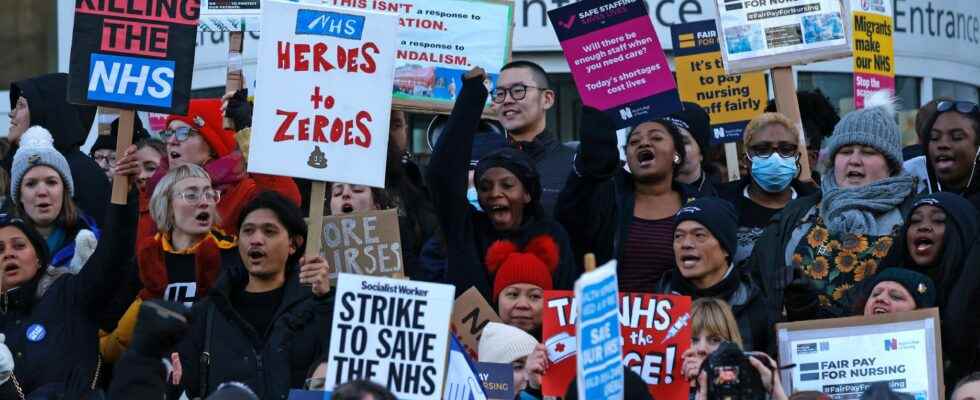The British celebrate this year the 75th anniversary of their universal and free health service… but sick. After a reign even longer than that of Elizabeth II – only seventy years – the famous NHS, for National Health Service, is hardly in good shape. For several months, repeated strikes by paramedics and nurses have brought to light the bankruptcy of the system. “The NHS was our sacred cow, and to criticize it was blasphemy, explains columnist Adam Boulton. We would rather suffer together than denounce its shortcomings.” But today the crisis is such that tongues are loosened.
“We are at the tipping point, maybe we have already tipped over,” laments Richard Sloggett, adviser to Health Minister Matt Hancock in 2018 and 2019. The diagnosis is overwhelming. On average, it takes ninety-two minutes before being taken care of for a heart attack or stroke, and twelve hours of waiting in the emergency room before even being registered! Seven million patients are on the waiting list for an operation, and there is an excess mortality of 50,000 deaths (excluding the pandemic) for the year 2022.
Nursing strikes in December led to the cancellation of 30,000 medical operations and procedures. “People don’t die because nurses are on strike; nurses are on strike because people are dying because they don’t have the means,” said Pat Cullen, head of the Royal College of Nursing. On strike for the first time in their history, nurses are demanding a 19.2% salary increase. “We will only be able to recruit and keep our nurses in the NHS if they receive a decent salary,” she warns. Otherwise, they will go private.
“The NHS is a service, not a mausoleum”
Many of them have already taken the plunge. And a lot of wealthy patients too. The British have lost faith in the system and no longer hide from it. According to the YouGov institute, 80% of them consider that the service offered by the institution is of poor quality. And an increase in wages will not be enough to change the situation. Because the NHS suffers from multiple pathologies: under-equipment, lack of manpower, loss of skills. In England alone, the number of beds has halved in thirty years, according to an analysis by the King’s Fund. And this, even as the number of patients has increased. In terms of equipment, the United Kingdom has just under nine scanners per million inhabitants, compared to an average of 26 scanners in OECD countries. Finally, there is a shortage of 130,000 nurses and other qualified personnel.
Politicians are beginning to consider alternatives to the NHS model. Health officer within the shadow cabinet (shadow government) of the opposition, Labor Wes Streeting recently shook the walls of Parliament in Westminster with his outspokenness. “More money for the NHS will not solve the problem, he thundered. We are not there anymore.” This Greater London MP knows what he’s talking about. In 2021, at the age of 39, he was diagnosed with kidney cancer. He is cured today, and his experience feeds his reflection. For months, his appointments for check-up scans of his tumor were canceled one after another. “What anguish and what a waste of time for me and my urologist!” Labor leader Keir Starmer would also like us to stop talking about the sacrosanct NHS in “religious” terms. “The NHS is a service, not a mausoleum: we must put an end to ideology, he says, and use the capacities of the private sector to remedy the shortcomings of the NHS. What matters to patients is to be treated as soon as possible, in private or in public.”
The elected official would also like patients to be able to consult specialists directly, as in France, without having to go through their general practitioner. In Great Britain, the general practitioner is the only point of entry into the health system and any medical treatment. However, it often takes more than a month to obtain this preliminary appointment. For his part, Wes Streeting is not afraid to alienate the powerful British Medical Association, the corporation of general practitioners, which defends this prerogative. “The NHS is totally destroyed, you have to be radical”, slice Streeting. This means making those who can afford it pay for a certain number of medical services and reserving free treatment for the poorest. As for former Conservative Health Minister Sajid Javid, he believes that the solution would be a German or French-style social insurance system, combining funding from taxpayers, employers and private insurers. If even France is seen as a model…
